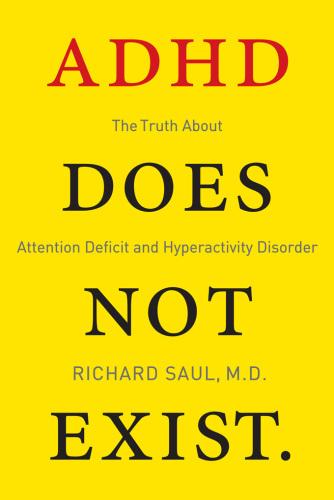
ADHD Does not Exist
The Truth About Attention Deficit and Hyperactivity Disorder
حقیقت در مورد کسری توجه و اختلال بیشفعالی
کتاب های مرتبط
- اطلاعات
- نقد و بررسی
- دیدگاه کاربران
نقد و بررسی

December 16, 2013
Saul, a behavioral neurologist with 50 years of clinical practice, isn’t joking around; after noting that 11% of American children are diagnosed with attention-deficit hyperactivity disorder—a 40% increase in a decade—he makes the provocative claim that, “among the millions of people diagnosed, not one of them actually has ADHD.” This matters for many reasons, particularly in that treatment for real disorders is delayed when ADHD is diagnosed and two-thirds of children diagnosed with ADHD take powerful stimulants with potentially debilitating side effects. Saul takes readers—parents, teachers, physicians—on a fascinating tour of conditions that share symptoms with ADHD. Children with Tourette’s disorder misdiagnosed as ADHD can experience amplified tics on ADHD stimulants. Other conditions with ADHD-like symptoms include undiagnosed hearing, sight, and sleep problems; undiagnosed giftedness, learning disabilities, mood and sensory processing disorders—even allergies. While few would argue with Saul’s contention that overdiagnosis is rampant, his uncompromising main theme will concern clinicians who regularly deal with the condition, whose criteria in the (much fought over) industry bible, the Diagnostic and Statistical Manual of Mental Disorders, were recently loosened. Nevertheless, parents will be better armed to ask more of the right questions after reading Saul’s book, which should spark much debate.

December 1, 2013
Behavioral neurologist Saul emphasizes a thorough approach to the diagnosis of attention deficit/hyperactivity disorder (ADHD), asserting that it is overdiagnosed, that correlating stimulant use has reached epidemic proportions, and that the name itself is a symptom descriptor, not a disorder. Saul maintains that knowledge and understanding of the conditions that are often misdiagnosed as ADHD are essential for appropriate and responsible treatment. More than 20 medical conditions and disorders that might be responsible for ADHD symptoms are presented, from hearing and vision problems, learning disabilities, mood disorders, and neurological problems to inherited genetic flaws and environmental factors such as allergies and toxin poisoning. Each chapter is constructed similarly, with an introductory case history, diagnostic clues, prevalence statistics, and treatment approaches. The largest section of the book, "The Conditions and Disorders Responsible for ADHD Symptoms," is an accessible, detailed, and well-documented list of rule-outs for those who are exploring an ADHD diagnosis. VERDICT Essential for parents and teachers.--Kellie Benson, Oakton Community Coll. Libs., Des Plaines, IL
Copyright 2013 Library Journal, LLC Used with permission.

























دیدگاه کاربران